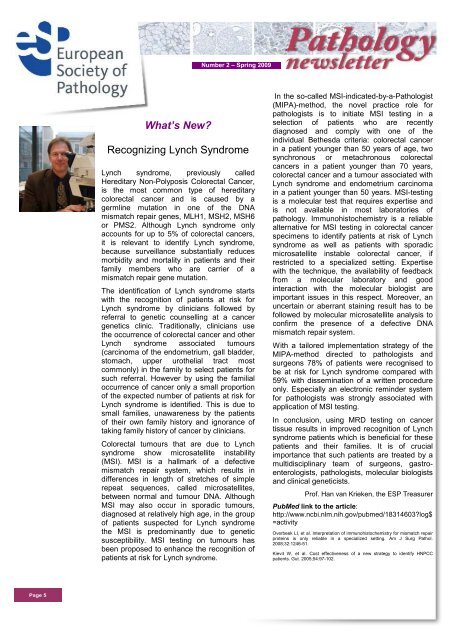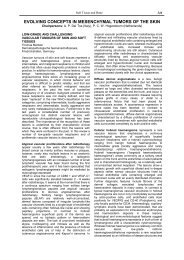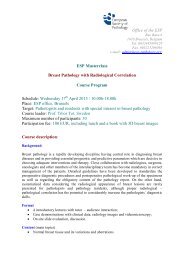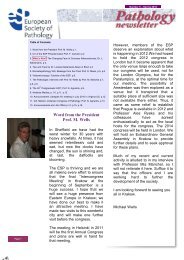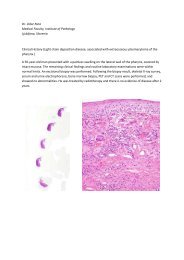Number 2 – Spring 2009 - European Society of Pathology
Number 2 – Spring 2009 - European Society of Pathology
Number 2 – Spring 2009 - European Society of Pathology
You also want an ePaper? Increase the reach of your titles
YUMPU automatically turns print PDFs into web optimized ePapers that Google loves.
Page 5<br />
What’s New?<br />
<strong>Number</strong> 2 <strong>–</strong> <strong>Spring</strong> <strong>2009</strong><br />
Recognizing Lynch Syndrome<br />
Lynch syndrome, previously called<br />
Hereditary Non-Polyposis Colorectal Cancer,<br />
is the most common type <strong>of</strong> hereditary<br />
colorectal cancer and is caused by a<br />
germline mutation in one <strong>of</strong> the DNA<br />
mismatch repair genes, MLH1, MSH2, MSH6<br />
or PMS2. Although Lynch syndrome only<br />
accounts for up to 5% <strong>of</strong> colorectal cancers,<br />
it is relevant to identify Lynch syndrome,<br />
because surveillance substantially reduces<br />
morbidity and mortality in patients and their<br />
family members who are carrier <strong>of</strong> a<br />
mismatch repair gene mutation.<br />
The identification <strong>of</strong> Lynch syndrome starts<br />
with the recognition <strong>of</strong> patients at risk for<br />
Lynch syndrome by clinicians followed by<br />
referral to genetic counselling at a cancer<br />
genetics clinic. Traditionally, clinicians use<br />
the occurrence <strong>of</strong> colorectal cancer and other<br />
Lynch syndrome associated tumours<br />
(carcinoma <strong>of</strong> the endometrium, gall bladder,<br />
stomach, upper urothelial tract most<br />
commonly) in the family to select patients for<br />
such referral. However by using the familial<br />
occurrence <strong>of</strong> cancer only a small proportion<br />
<strong>of</strong> the expected number <strong>of</strong> patients at risk for<br />
Lynch syndrome is identified. This is due to<br />
small families, unawareness by the patients<br />
<strong>of</strong> their own family history and ignorance <strong>of</strong><br />
taking family history <strong>of</strong> cancer by clinicians.<br />
Colorectal tumours that are due to Lynch<br />
syndrome show microsatellite instability<br />
(MSI). MSI is a hallmark <strong>of</strong> a defective<br />
mismatch repair system, which results in<br />
differences in length <strong>of</strong> stretches <strong>of</strong> simple<br />
repeat sequences, called microsatellites,<br />
between normal and tumour DNA. Although<br />
MSI may also occur in sporadic tumours,<br />
diagnosed at relatively high age, in the group<br />
<strong>of</strong> patients suspected for Lynch syndrome<br />
the MSI is predominantly due to genetic<br />
susceptibility. MSI testing on tumours has<br />
been proposed to enhance the recognition <strong>of</strong><br />
patients at risk for Lynch syndrome.<br />
In the so-called MSI-indicated-by-a-Pathologist<br />
(MIPA)-method, the novel practice role for<br />
pathologists is to initiate MSI testing in a<br />
selection <strong>of</strong> patients who are recently<br />
diagnosed and comply with one <strong>of</strong> the<br />
individual Bethesda criteria: colorectal cancer<br />
in a patient younger than 50 years <strong>of</strong> age, two<br />
synchronous or metachronous colorectal<br />
cancers in a patient younger than 70 years,<br />
colorectal cancer and a tumour associated with<br />
Lynch syndrome and endometrium carcinoma<br />
in a patient younger than 50 years. MSI-testing<br />
is a molecular test that requires expertise and<br />
is not available in most laboratories <strong>of</strong><br />
pathology. Immunohistochemistry is a reliable<br />
alternative for MSI testing in colorectal cancer<br />
specimens to identify patients at risk <strong>of</strong> Lynch<br />
syndrome as well as patients with sporadic<br />
microsatellite instable colorectal cancer, if<br />
restricted to a specialized setting. Expertise<br />
with the technique, the availability <strong>of</strong> feedback<br />
from a molecular laboratory and good<br />
interaction with the molecular biologist are<br />
important issues in this respect. Moreover, an<br />
uncertain or aberrant staining result has to be<br />
followed by molecular microsatellite analysis to<br />
confirm the presence <strong>of</strong> a defective DNA<br />
mismatch repair system.<br />
With a tailored implementation strategy <strong>of</strong> the<br />
MIPA-method directed to pathologists and<br />
surgeons 78% <strong>of</strong> patients were recognised to<br />
be at risk for Lynch syndrome compared with<br />
59% with dissemination <strong>of</strong> a written procedure<br />
only. Especially an electronic reminder system<br />
for pathologists was strongly associated with<br />
application <strong>of</strong> MSI testing.<br />
In conclusion, using MRD testing on cancer<br />
tissue results in improved recognition <strong>of</strong> Lynch<br />
syndrome patients which is beneficial for these<br />
patients and their families. It is <strong>of</strong> crucial<br />
importance that such patients are treated by a<br />
multidisciplinary team <strong>of</strong> surgeons, gastroenterologists,<br />
pathologists, molecular biologists<br />
and clinical geneticists.<br />
Pr<strong>of</strong>. Han van Krieken, the ESP Treasurer<br />
PubMed link to the article:<br />
http://www.ncbi.nlm.nih.gov/pubmed/18314603?log$<br />
=activity<br />
Overbeek LI, et al. Interpretation <strong>of</strong> immunohistochemistry for mismatch repair<br />
proteins is only reliable in a specialized setting. Am J Surg Pathol.<br />
2008;32:1246-51.<br />
Kievit W, et al. Cost effectiveness <strong>of</strong> a new strategy to identify HNPCC<br />
patients. Gut. 2005;54:97-102.


